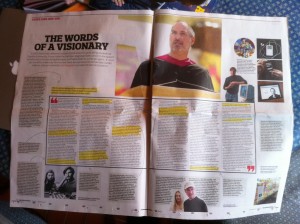I’ve written a long piece about Steve Jobs for today’s Observer. Extract:
When the time comes to sum up Jobs’s achievements, most will portray him as a seminal figure in the computing industry. But Jobs is bigger than that.
To understand why, you have to look at the major communications industries of the 20th century – the telephone, radio and movies. As Tim Wu chronicles it in his remarkable book, The Master Switch, each of these industries started out as an open, irrationally exuberant, chaotic muddle of incompatible standards, crummy technology and chancers. The pivotal moment in the evolution of each industry came when a charismatic entrepreneur arrived to offer consumers better quality, higher production values and greater ease of use.
With the telephone it was Theodore Vail of AT&T, offering a unified nationwide network and a guarantee that when you picked up the phone you always got a dial tone. With radio it was David Sarnoff, who founded RCA. With movies it was Adolph Zukor, who created the Hollywood studio system.
Jobs is from the same mould. He believes that using a computer should be delightful, not painful; that it should be easy to seamlessly transfer music from a CD on to a hard drive and thence to an elegant portable player; that mobile phones should be powerful handheld computers that happen to make voice calls; and that a tablet computer is the device that is ushering us into a post-PC world. He has offered consumers a better proposition than the rest of the industry could – and they jumped at it. That’s how he built Apple into the world’s most valuable company. And it’s why he is really the last of the media moguls.
David Pogue had an insightful piece about Jobs in the New York Times. This passage caught my eye:
In Silicon Valley, success begets success. And at this point, few companies have as high a concentration of geniuses — in technology, design and marketing — as Apple. Leaders like the design god Jonathan Ive and the operations mastermind Tim Cook won’t let the company go astray.
So it’s pretty clear that for the next few years, at least, Apple will still be Apple without Mr. Jobs as involved as he’s been for years.
But despite these positive signs, there’s one heck of a huge elephant in the room — one unavoidable reason why it’s hard to imagine Apple without Mr. Jobs steering the ship: personality.
His personality made Apple Apple. That’s why no other company has ever been able to duplicate Apple’s success. Even when Microsoft or Google or Hewlett-Packard tried to mimic Apple’s every move, run its designs through the corporate copying machine, they never succeeded. And that’s because they never had such a single, razor-focused, deeply opinionated, micromanaging, uncompromising, charismatic, persuasive, mind-blowingly visionary leader.
By maintaining so much control over even the smallest design decisions, by anticipating what we all wanted even before we did, by spotting the promise in new technologies when they were still prototypes, Steve Jobs ran Apple with the nimbleness of a start-up company, even as he built it into one of the world’s biggest enterprises.
“I believe Apple’s brightest and most innovative days are ahead of it,” Mr. Jobs wrote in his resignation letter.
That’s a wonderful endorsement. But really? Can he really mean that Apple’s days will be brighter and more innovative without him in the driver’s seat?
And Charles Arthur argues that Jobs’s greatest legacy lies in being the man who persuaded the world to pay for online content:
Jobs pried open many content companies’ thinking, because his focus was always on getting something great to the customer with as few obstacles as possible. In that sense, he was like a corporate embodiment of the internet; except he thought people should pay for what they got. He always, always insisted you should pay for value, and that extended to content too. The App and Music Store remains one of the biggest generators of purely digital revenue in the world, and certainly the most diverse; while Google’s Android might be the fastest-selling smartphone mobile OS, its Market generates pitiful revenues, and I haven’t heard of anyone proclaiming their successes from selling music, films or books through Google’s offerings.
Jobs’s resignation might look like the end of an era, and for certain parts of the technology industry it is. For the content industries, it’s also a loss: Jobs was a champion of getting customers who would pay you for your stuff. The fact that magazine apps like The Daily haven’t set the world alight (yet?) isn’t a failure of the iPad (which is selling 9m a quarter while still only 15 months old; at the same point in the iPod’s life, just 219,000 were sold in the financial quarter, compared with the 22m – 100 times more – of its peak). It’s more like a reflection of our times.
So if you’re wondering how Jobs’s departure affects the media world, consider that it’s the loss of one of the biggest boosters of paid-for content the business ever had. Who’s going to replace that?
which includes the transcript of an email exchange he and I had about it.

